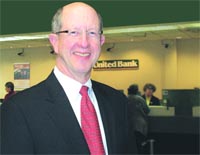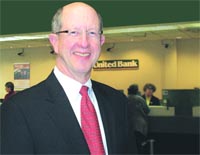
Capital Gains
United Bank Is Paving New Avenues for Growth
Well-capitalized after going public several years ago, aggressively branching out, and operating in a regional banking sector that is generally healthy compared to the nation as a whole, United Bank has a lot going for it, says its president, Richard Collins. On the flip side, the areas banking landscape remains fiercely competitive, especially given limited demand for commercial loans in a lackluster economy. To succeed, a bank needs to set itself apart with service and a wide range of financial products and by always keeping an eye on the next trend.
At a time when banks nationally are failing or at least in crisis, United Bank has benefited from good decisions, says its chief executive not to mention some good timing.
Specifically, upon becoming a fully public bank last December, United raised $95 million in its second public offering, following an initial round in 2005 that netted $72 million. That puts us on a short list of banks with an awful lot of capital, said Richard Collins, president of the 126-year-old institution.
I wish I could say I was smart enough to see the banking crisis coming, he added, but we did raise capital to prepare for growth and whatever the future might bring. And having this much capital means were not affected by some of the problems of the national banks.
Specifically, Collins noted that United, like many institutions in its region, is not burdened with the toxic paper that has weighted down the large Wall Street banks mainly in the form of subprime loans.
We havent made any troublesome investments, he said. A lot of banks bought Fannie Mae- and Freddie Mac-preferred stock, but weve stayed away from that, and we dont do any subprime lending. Every mortgage loan we make, we intend to keep, so we make those loans in a way that were happy to have them on the balance sheet.
So were anxious to lend, Collins continued. Were anxious to put dollars out there, but it has to be in a fashion that adheres to straightforward lending standards. Well stick with that, and we can put dollars to work for qualified borrowers who are looking for a home loan, car loan, or business loan.
Going public was key to a newly aggressive growth stance for United, which has operated from its West Springfield headquarters since 1882.
At the start of 2006, United boasted a dozen branches across the Pioneer Valley, but then began rapidly expanding, adding five locations over the past three years. First was a downtown Northampton office in mid-2006, followed by a Westfield branch in early 2007. This year alone has seen United expand into Longmeadow and Agawam, and also add an express branch right off Interstate 91 in Northampton in order to serve drive-thru customers; the citys other branch takes only walk-ins.
Plans for a branch in Chicopee, are underway, and then well keep looking from there, said Dena Hall, vice president of marketing and community relations, noting that all the new branches are performing well a critical factor, since no bank wants to expand just to have a presence in a certain town.
If a branch doesnt do well, its very expensive, between maintaining the building, paying rent, and paying our people, said Collins. Fortunately, that doesnt seem to be happening.
What is happening is a period of robust expansion for United, in an effort to attract more business in Western Mass., a region known for as fiercely competitive banking landscape. In this issue, BusinessWest examines some of the strategies United is employing to do just that.
Saving Money and Time
Some concepts seem like small matters, but go to the heart of customer service, which is critical to retain business with so many other banking options available, said Hall. Take, for example, that express branch off I-91. The idea was to meet the needs of those who couldnt drive right up before, she explained, but weve been pleasantly surprised by the foot traffic.
Its the most basic example of the different ways customers choose to conduct bank business today, she noted. For example, United, which had one of the first Internet banking products in the region, recently introduced mobile banking, which allows access to financial information using a cell phone.
But customers who use such technology arent completely divorced from bricks-and-mortar banking, she said; increasingly, many people want a mix of both which is why United is expanding its physical presence along with its technological options.
Were an older bank, so weve been around a long time, said Collins. But in terms of introducing our customers to computer-based products, weve been pretty far ahead of the curve.
Offering convenience and a variety of banking options isnt just window dressing, however not in Western Mass., where an overload of different banks are all competing for business. For example, he said, Id like to see a more-vibrant market for commercial loans, but the economy is not demanding it, and there are other good banks out there who want a piece of those loans.
Were having some growth in the commercial portfolio, but its not as robust as Id like it to be, whether thats due to the health of the market, or the competition out there for commercial loans, or a little bit of both, he added.
Collins doesnt include the ongoing national banking crisis on that list of factors at least not so high because, like other executives BusinessWest has spoken to recently, he describes the Western Mass. banking sector as essentially healthy and well-capitalized.
That gives United opportunities to seek growth areas, such as its 2006 purchase of a Northampton-based financial advisory firm, the Levine Financial Group, which added $88 million in assets under management. Today, the United Wealth Management Group reports $120 million in investments.
Indeed, Hall noted, on the investment side, weve done a good job increasing our presence and expanding awareness in our area. Certainly, over the last couple of months, the financial markets have been steadying, and our representatives have been actively calling customers, having meetings, and fielding phone calls. Theyre being proactive to reach a level of service thats crucial to a locally based group such as ours.
Collins said having a solid investment arm is important at a time when many individuals either want to do all their financial business under one roof, or mistrust traditional brokerage houses, for whatever reason.
Some people like working with a bank in terms of managing personal wealth. The bank is central to our financial life in lots of ways, he said. I think our reputation for being customer-oriented helps us attract people, and we offer a great line of investment products and the professionals we work with can help people make those decisions.
At the same time, theres a lot of competition, he continued, but were picking up people who are comforted by having wealth management done through their bank. There are some concerns about some of the larger brokerage firms having problems or being reorganized. Were a small organization, but weve got a lot of capital and no real problems in our loan or securities portfolios, and theres not much chance that well be forced into a sale.
Personal Touch
Collins stressed, however, that Uniteds success will not be achieved simply by expanding its locations and product lines. An emphasis on customer service is reflected in Uniteds personal bankers, who operate under a model that assigns each retail customer to one employee who is tasked with getting to know them and their individual needs over the long term.
Hall explained that the concept is also reflected on the commercial-lending side. We have a team approach, where the customer has not only a lender, but also a personal loan assistant working behind the scenes, doing what needs to be done. We have business-development officers who sell cash-management products and personal bankers on the retail side.
Hall said the personal-banker model is one reason why United is able keep its own employee-retention rate around 95%. Weve done a nice job attracting new employees from other banks, and also promoting from within, she noted.
Weve had very little turnover. Its a unique job. Personal bankers are responsible for maintaining the customer relationship. They dont have to be concerned with the branch hours and the teller lines; a branch manager sees to that. Theyre here for the customers.
Its a model that has captured plenty of attention in the community, Hall added. Its funny; when I tell people I work for United, they immediately say, my personal banker is Nancy, or my personal banker is Judy. The concept has really worked.
And community remains an important part of Uniteds culture, as well. Hall heads up the banks charitable foundation, which was launched in 2005 and typically grants between $200,000 and $240,000 annually to nonprofit organizations.
Weve always tried to be a good community partner, she told BusinessWest, and we support a lot of different foundations in different ways. Between the foundation and bank sponsorships such as the one forged with the Springfield Falcons United puts about $350,000 into the community each year.
People see that and recognize that were committed to the community, Hall said. We cant always say yes, but we try to do as much as we can.
Its a cheerful thought, which is appropriate as the skies begin to clear at least a little bit over the nations financial crisis, aided by the recent government bailout and additional layers of protection from the Federal Deposit Insurance Corp.
People have been concerned, Collins, but theyre less worried now.
Perhaps confident enough to borrow money and invest for the future. If so, United is willing to talk.
Joseph Bednar can be reached at[email protected]






